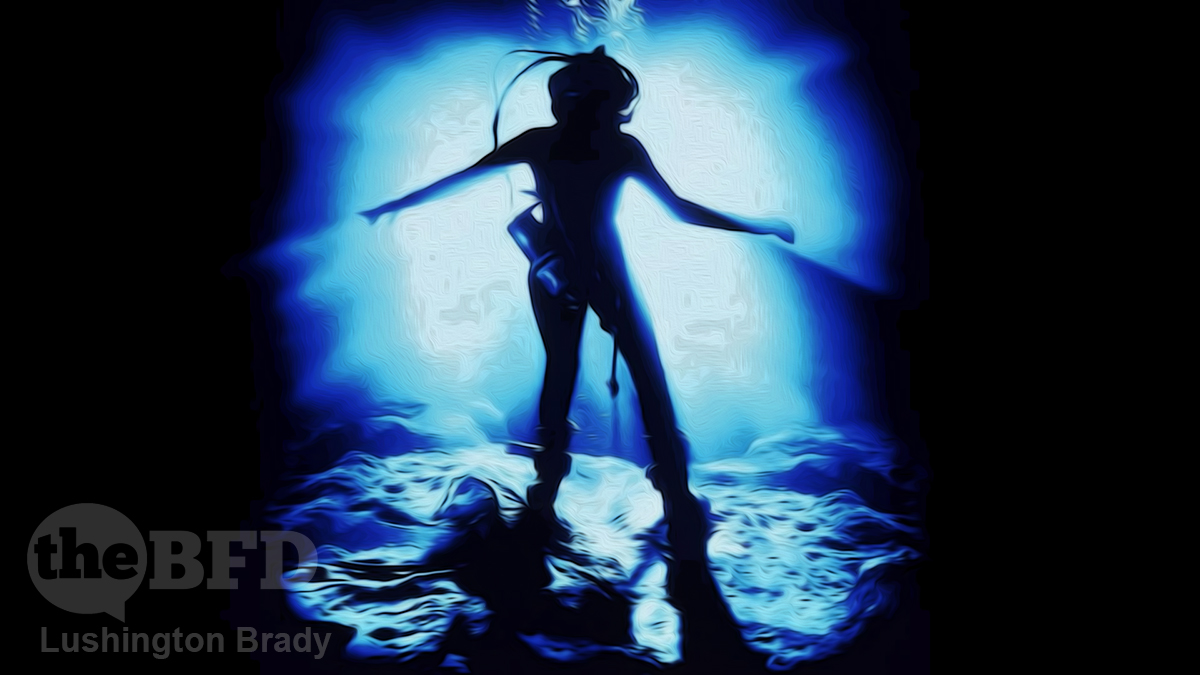His name is James, James Cameron, the bravest pioneer… but surely, in the 13 years he’s been buggerising around in submersibles and making yet another yawn-inducing spectacle about the creepiest blue cat-people this side of MidFur, James Cameron could have found the time to bring one of his best, yet most under-rated films out on 4K? Sadly, for the moment, we’ll have to make do with watching The Abyss on primitive old DVD.
The Abyss is strangely neglected in Cameron’s film canon — strangely because it’s easily one of his best. It’s probably beaten out of the top spot by Aliens and The Terminator, but it still belongs in his Top 5. The only thing that mars the film is the very one thing that has come to typify his latter film output: ruining a solid SF adventure story by overdosing on mawkish, hamfisted “messaging” (mercifully, most of the “message” was cut from the theatrical release).
In terms of the overall story, though, and by a country mile when it comes to action, great performances and dazzling technical skill, The Abyss is an only slightly-flawed masterpiece.
In the first of Cameron’s cinematic forays into watery worlds, The Abyss tells the story of a team of roughneck oil workers whose experimental underwater drilling rig is co-opted by Navy SEALs investigating the sinking of a nuclear-armed submarine in a deep-ocean trough — and making contact with a race of deep-sea dwelling aliens who’ve been lurking at the bottom of the ocean unnoticed for decades.
Perhaps part of The Abyss’s lapse into obscurity is the fact that very few of the actors involved ever wanted to talk about the film again, after its notoriously punishing production schedule.
Cameron’s desire to shoot the film’s underwater sequences as practically as possible meant that 40% of the filming on The Abyss was done in massive water tanks. Cameron, the film’s crew, and the actors all had to spend hours at a time underwater, which resulted in a decompression chamber being built on-site and special safety divers being assigned for each actor.
The process wore down everyone who worked on the film, but their hard work paid off. The Abyss is one of the most beautiful-looking films that Cameron has ever made, and that’s thanks in large part to the practical means in which it was shot and Mikael Salomon’s work as its cinematographer. It’s the kind of film that fills you with awe while watching because you just have no idea how they managed to make it.
Inverse
To get an idea of just how tough filming The Abyss was, watch The Critical Drinker’s “Production Hell” episode on it.
But was it all worth it? As a cinema-goer: absolutely. The Abyss is a film I’ve watched countless times since its release. While Cameron can sometimes be accused of lazy casting, in The Abyss, everyone, from leads Ed Harris, Mary Elizabeth Mastrantonio, and Michael Biehn, to the array of memorable, likeable supporting actors, turns in a stellar performance.
As with most of Cameron’s first decade of films, though, visual spectacle and virtuoso technical skill dazzle the eyes, even as they’re grounded by the human drama.
Much has been written about the ground-breaking special effects. In fact, if you Google the film, one of the first things you’ll find is the “water tentacle” scene where an underwater alien uses fluid to mimic a human face. The morphing effect predates a similar liquid metal visual in Cameron’s 1992 film Terminator 2: Judgement Day.
But all the technical talk tragically overshadows why The Abyss is great. Of all Cameron’s films, this is the one most like Aliens, in that it captures just how emotionally affecting a sci-fi story can be when it’s about a group of people trapped in a hostile environment.
But what makes The Abyss truly great is how it elevates a classic sci-fi premise: What if an advanced intelligence encountered the arms races happening around the world, and judged humanity for them?
“It was my version of The Day The Earth Stood Still,” Cameron said in Empire. “A function of my Cold War angst, and a comment on how an alien super-intelligence might judge rather harshly the way we mistreat each other and our beautiful world.”
This is not a bad premise: except that the aliens come across as over-cutesy underwater ET the Extraterrestrials, and the messaging is as hamfisted as the romance in Titanic.
But as the heroes grapple with their paranoias, hopes, enmities and clashing personalities — and the ever-present danger of being crushed to a pulp in the blackness of a deep-ocean trench — and as Cameron blows the viewer away with a commitment to rigorously grounded technical virtuosity (even going so far as to for-real immersing a live rat in a breathable liquid), all of that is easily forgiven.
Nothing about The Abyss contains the same indulgence or over-the-top quality of Cameron’s other blockbusters. It’s tempting to say Aliens is still his best, but it benefits from piggybacking off Ridley Scott’s 1979 original. The Abyss, meanwhile, is more original than either Terminator, and quieter and less ostentatious than either Avatar.
The Abyss is a humbler kind of Cameron movie, and it’s aged well.
Inverse
Fans of the film are abuzz with the news that Cameron has teased a 2023 4K remaster of The Abyss. Until then, we’ll just have to make do with the DVD release from two decades ago (it’s not even available to stream, locally). Bugger yawneroos like Avatar: The Way of Water, this is the James Cameron masterpiece I’m looking forward to in 2023.

